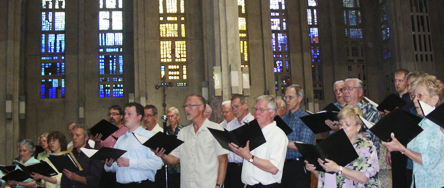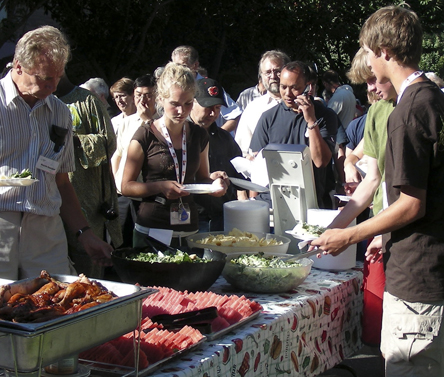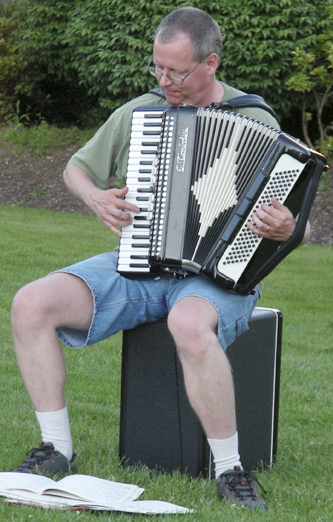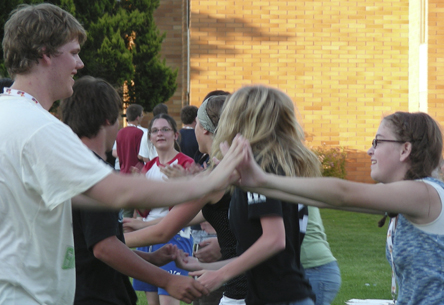Canadian Mennonite
Abbotsford Assembly Special Report
July 4-7, 2007

Delegates strongly affirm peace statement
Delegates lined up several people deep behind microphones on Thursday morning to speak in support of the draft affirmation statement against militarization in Canada and to share ways to act on it.
The session closed with delegates unanimously passing the statement, which reads: “Mennonite Church Canada believes that ‘peace is the will of God’ and that we need to ‘witness to all people that violence is not the will of God’ (Confession of Faith in a Mennonite Perspective, pages 81-82). Given this gospel understanding, we lament and oppose that the imaginations of our church and society are increasingly captivated by confidence in military solutions to human problems. May God grant us wisdom to discern and grace to act in ways that promote God’s will for peace on Earth.”
“Our group can report that they definitely say yes,” said Ed Lehming of Wideman Mennonite Church in Markham, Ont. Lehming suggested speaking to MPs one-on-one, encouraging a letter-writing campaign in favour of bill C-460 (which allows taxes to be used for non-military purposes), and to emphasize the peacekeeping stance with other faith groups.
“Our group was very much in favour of the statement,” said Henry Patkau of Hope Mennonite Fellowship in North Battleford, Sask. “It was suggested that we make known to Stephen Harper our disappointment in a continued increase in militarization.”
“For 50 years, Canada has not been in a war. Now we need to look at it again,” said Earl Smith of Hagerman Mennonite Church in Markham.
Several others also spoke in favour of the statement and spoke of the importance of being peacemakers.
In one case, the statement was felt to not be strong enough. “We’re friends with a military chaplain and he would even agree with this statement, which raises a question in my mind. Although I affirm this statement and want to move forward on it, I think it is too soft,” said Tym Elias of Home Street Mennonite Church in Winnipeg
However, Ken Quiring, of Grace Mennonite Church in Brandon, Man., said his group was not convinced that the wider church would be “completely with” the statement. “A lot who come to these events would be, but a lot in our congregations would be more conflicted,” he said. He added that the church is far too hesitant to be clear about from where its peace position comes. “Our calling in this comes through Jesus Christ, who brings us peace from God. This doesn’t come from some generic humanism or from a nice liberal democracy.
“Our congregation in Brandon, we often feel very alone living next to the now enlarged base in Shilo,” Quiring added. “We would like to ask for resources…on knowing how to get to know the families of soldiers, rather than polarizing materials.”
There was also a caution on how Mennonites talk about peacemaking.
“We also need to be careful not to ostracize those that have made other choices, but who are still willing to engage in conversation,” said Clare Neufeld of First Mennonite in Kelowna, B.C.. “We need to be peacemakers in our personal relationships. Someone observed rather astutely that some are quite militant in our peace stance,” he said.
Thursday filled with touring, picnicking, preaching
 |
Delegates and guests at the 2007 MC Canada assembly got a taste of the Fraser Valley Thursday through a variety of activities.
The day began with the morning worship session. A children’s “scientific experiment” led by Heidi Epp had the children thinking of ways everyone present was alike or different. The congregation rose when questions were asked that applied to them: Who is left-handed? Who has a food allergy? Who was born outside Canada? And then everyone got to their feet when asked, “Who loves God?”
Additional Resources
|
The morning storyteller was Dann Pantoja, MC Canada Witness worker in Mindanao, the Philippines, who currently fellowships at Peace Mennonite Church in Richmond, B.C. Pantoja talked about Muslim-Christian Peacebuilding Partners in the Philippines and shared the story of how a Muslim and a Christian man—two opposites—had come to understand each other through a three-day boat ride together.
 |
After the morning discernment sessions and lunch, participants enjoyed their choice of field trips through B.C.’s beautiful Fraser Valley, which—fortunately—also included beautiful weather. Some visited the Minter Gardens near Chilliwack. Others went to Westminster Abbey in Mission that included a choral concert. Still others learned more about the large Sikh community in Abbotsford through a tour of its temple.
In the evening, adults joined the youths for a barbecue supper on the campus of Trinity Western University in Langley, where the youths have been lodging this week.
After the meal, the participants eagerly listened to the second annual “preach-off,” in which 15 participants were given a Scripture passage—usually an obscure one from the Old Testament—and three minutes to expound upon it in any way they chose. After an extremely entertaining series of sermons—with many clever gimmicks and styles—the judges chose Carol Penner of Vineland, Ont., as the winner. Penner chose an audience musical participation sermon on the prophet Elisha being teased by a group of boys, from II Kings 2.
 |
The rest of the evening people played volleyball, participated in circle games, or just visited.
 |